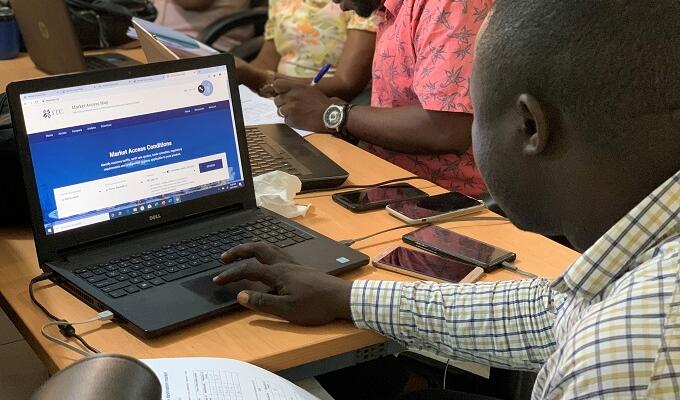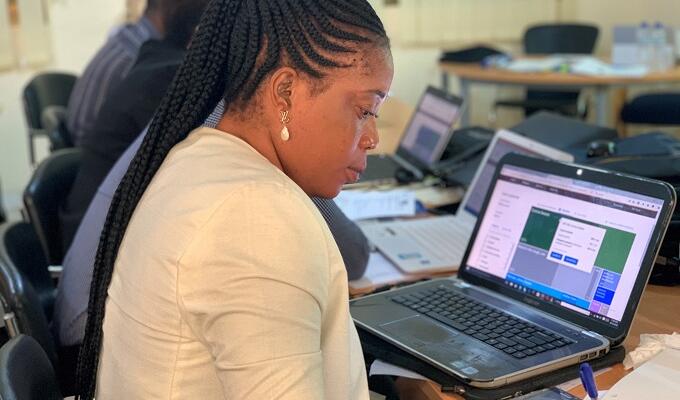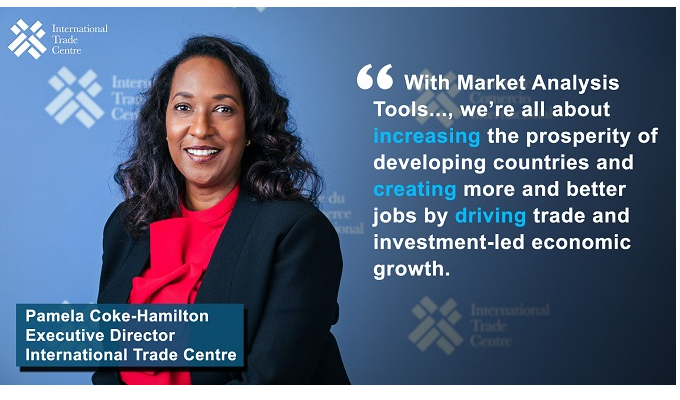



Story: International Trade Centre trade tools register 1 million users (en)
The International Trade Centre's (ITC) market analysis tools have reached a significant milestone in 2020, with registered users passing one million for the first time.
The tools, a suite of free web-based services, allow users to access up-to-date trade statistics, company data, customs tariffs and non-tariff measures, foreign direct investment and other crucial analysis and trade intelligence.
'These services go a long way to levelling the playing field for developing country businesses, trade policy advisors and others to improve their trade and investment decisions,' ITC Executive Director Pamela Coke-Hamilton said.
'In 2019, for instance, these tools helped generate trade transactions for its users around the world worth $367 million according to our annual survey.'
'Ultimately, we're all about increasing the prosperity of developing countries and creating more and better jobs by driving trade and investment-led economic growth,' said Ms. Coke-Hamilton.
'By increasing trade diversity both in terms of sectors and markets, developing countries can increase their resilience to sudden shifts in supply and demand and get paid more for their value-added products and services.'
Supported by the EU's transparency in trade project and ITC's trust fund donors, the tools have proved invaluable during the COVID-19 pandemic. They have helped businesses to navigate pandemic-related policy responses in both sourcing and destination countries.
'We've seen dramatic contractions in key import markets and disruptions to global supply chains,' Ms. Coke-Hamilton said.
'But we also know that not all sectors have suffered equally. And our tools can help exporters identify growth opportunities - such as agro-food sectors and medical supplies − even in these challenging times.'
Global users can access ITC's data-driven analytical tools to inform them to take decisions such as:
- which countries to target with their exports
- which sectors to diversify into
- how they adapt their products, services and operations to meet market demands
- which strategies to adopt to attract investment in promising sectors
'ITC's work aligns closely with the multiannual EU programme Global Public Goods and Challenges (GPGC),' Ms. Coke-Hamilton said.
'A key issue facing economic actors in developing countries is affordable access to reliable data and current business intelligence. Small companies and under-resourced trade promotion or trade negotiation teams are substantially disadvantaged. ITC rectifies this by embedding the most current market information into analytical applications that draw on state-of-the-art economic methodologies for trade diversification.'
Since the advent of Trade Map, the first tool developed in 2002, new services have been continuously added, including Market Access Map; Export Potential Map; Standards Map; Procurement Map; Market Price Information; Investment Map; Rules of Origin Facilitator as well as regional integration tools like the Euromed Trade Helpdesk and the India-East Africa Trade Helpdesk.
ITC has added French and Spanish to its Market Analysis Tools portal to ensure that speakers of these languages can make the most of the vast array of data and analysis options. The portal is an integrated single entry point, enabling seamless navigation from one tool to another. It also features country profiles and a full suite of free multi-lingual e-learning materials. More relevant than ever in 2020, the distance learning materials have been viewed more than 591,000 times and guide users systematically through practical analysis scenarios.
As well as online learning, ITC delivers face-to-face capacity building and provides coaching to certified trainers at trade and investment support institutions (TISIs) to multiply the tools' reach and impact.
For instance, ITC closely supported Tanzanian certified trainers delivered training on trade and market access analysis to more than 110 local students and companies − despite ongoing travel restrictions.
ITC regularly monitors the impact of its tools. Last year 94% of beneficiaries surveyed attributed improved operation efficiency e.g. reducing time or cost of obtaining needed information to their use of ITC's tools.
'Thanks to ITC's tools, we made transactions with Germany and the Netherlands, and we also expect to do business with the UK,' reported a medium-sized enterprise in North Africa.
A small enterprise in the Asia Pacific liked the useful company data in Trade Map: 'I searched to supply freeze-dried vegetables and fruits using ITC analysis. It will help to identify a German importer.'
The tools are not only used for global north-south trade. They also facilitate intra-regional trade, including among developing countries, and shed light on often hard-to-research markets where data is scarce.
'We conducted a market study for fonio [a grain] exports from Guinea,' said one user. 'The tools allowed us to understand the growth of fonio imports to Nigeria and to know their main suppliers, growth trends and import duty levels.'
Another small exporter from the Asia Pacific region said: 'Recently I participated in the China International Import Expo 2019 in Shanghai. I used ITC tools to know the tariff and non-tariff information about China.'
Institutions and policymakers are also taking advantage of the powerful analytics of ITC's tools.
'I've been undertaking analysis of the impact of Malaysia ratifying The Comprehensive and Progressive Agreement for Trans-Pacific Partnership (CPTPP),' said an analyst from a Malaysian think tank. .
A user in Africa shared their experience: 'I have been using the tools to identify regional supply gaps in the value chains that the region has the potential capacity to increase production such as agro-processing. The objective is to identify opportunities for enhancing intra-regional trade by substituting imports with regional production in areas where there is underutilized capacity.'
'We listen carefully to our clients so we can continuously evolve. Making these tools free as global public goods comes down to one word - empowerment,' said Mondher Mimouni, Chief of ITC's Trade and Market Intelligence section.
For example, until recently, Comorian producers were selling their vanilla at an unsustainably low price that weakened the viability of their businesses.
Using ITC's Market Price Information, analysis of competitor data in Trade Map and a customized tool developed by ITC for local producers and cooperatives to receive prices from international marketplaces and share information on local production prices helped producers substantially increasing their export income.
'We could see first-hand the difference this made to producers' livelihoods,' said Mr. Mimouni.



